Professional Practice and Research Report: Nursing Ethics and Skills
VerifiedAdded on 2021/06/18
|9
|2088
|52
Report
AI Summary
This report delves into the critical aspects of professional practice within the healthcare field, specifically from an occupational therapist's perspective. It addresses the challenges faced in acute care settings, emphasizing the importance of evidence-based practices, communication skills, and adherence to ethical guidelines. The report highlights learning needs, focusing on implementing ethical practices, strengthening interpersonal skills, and understanding clinical ethics to ensure quality patient care and address issues like patient confidentiality and data protection. The author discusses research interests in evidence-based clinical nursing practices, particularly regarding patient confidentiality, and proposes a confidentiality model to protect patient information. Furthermore, the report examines ethical dilemmas, such as requests for patient information from family members, and emphasizes the need for effective communication and negotiation skills. In conclusion, the report underscores the importance of focusing on communication, problem-solving skills, and knowledge of information sharing to enhance professional practice within an acute healthcare environment.
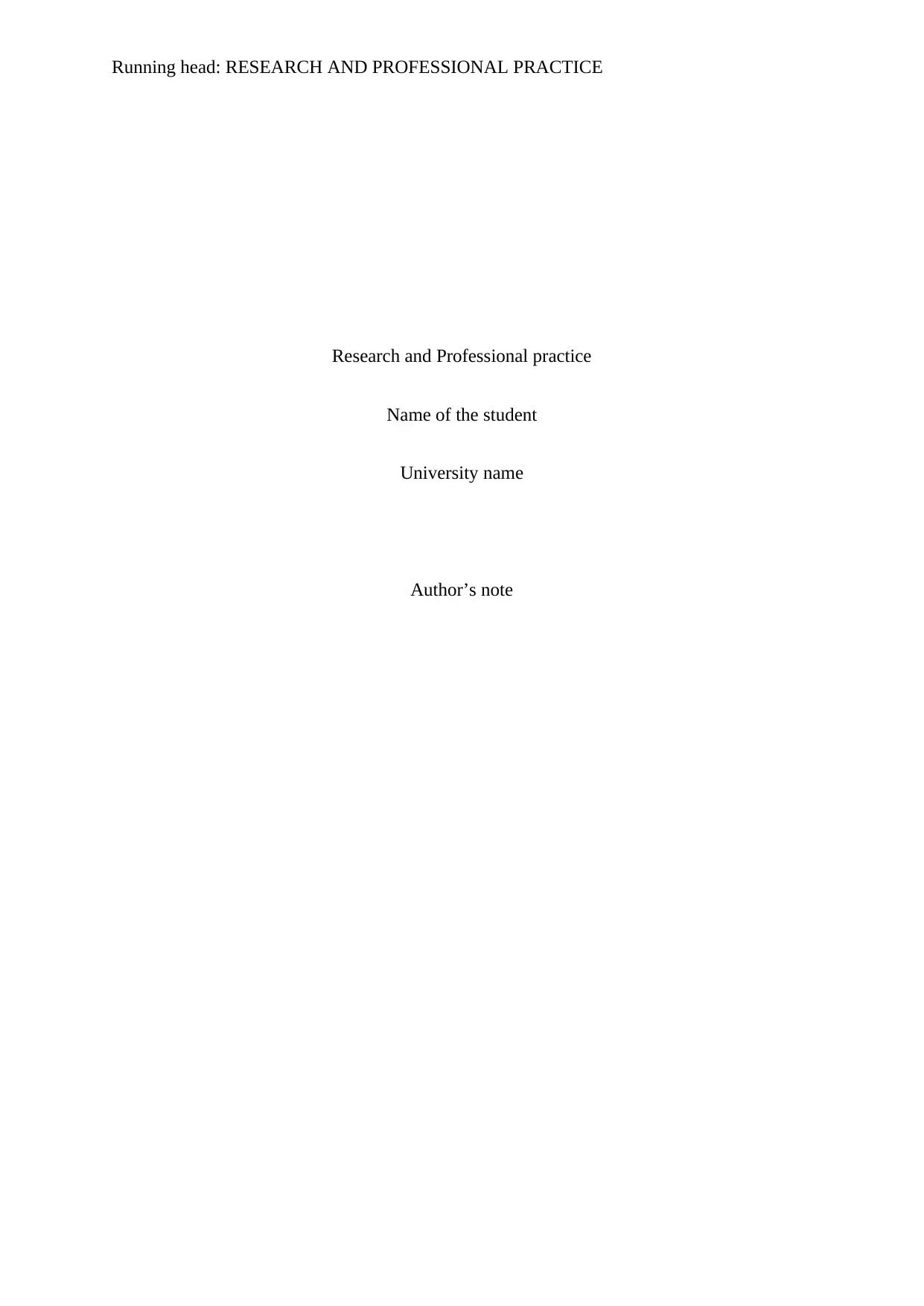
Running head: RESEARCH AND PROFESSIONAL PRACTICE
Research and Professional practice
Name of the student
University name
Author’s note
Research and Professional practice
Name of the student
University name
Author’s note
Paraphrase This Document
Need a fresh take? Get an instant paraphrase of this document with our AI Paraphraser
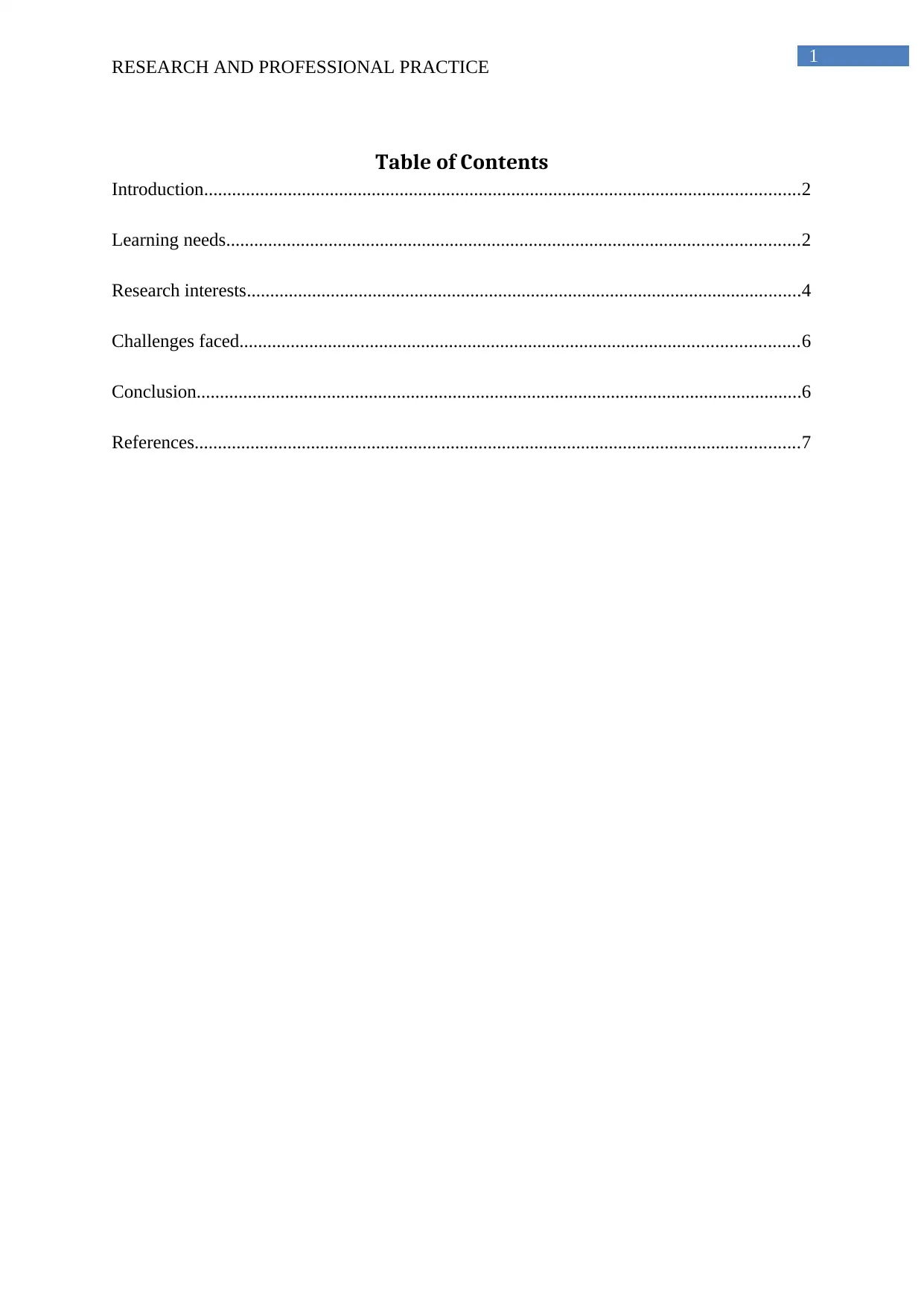
1
RESEARCH AND PROFESSIONAL PRACTICE
Table of Contents
Introduction................................................................................................................................2
Learning needs...........................................................................................................................2
Research interests.......................................................................................................................4
Challenges faced........................................................................................................................6
Conclusion..................................................................................................................................6
References..................................................................................................................................7
RESEARCH AND PROFESSIONAL PRACTICE
Table of Contents
Introduction................................................................................................................................2
Learning needs...........................................................................................................................2
Research interests.......................................................................................................................4
Challenges faced........................................................................................................................6
Conclusion..................................................................................................................................6
References..................................................................................................................................7
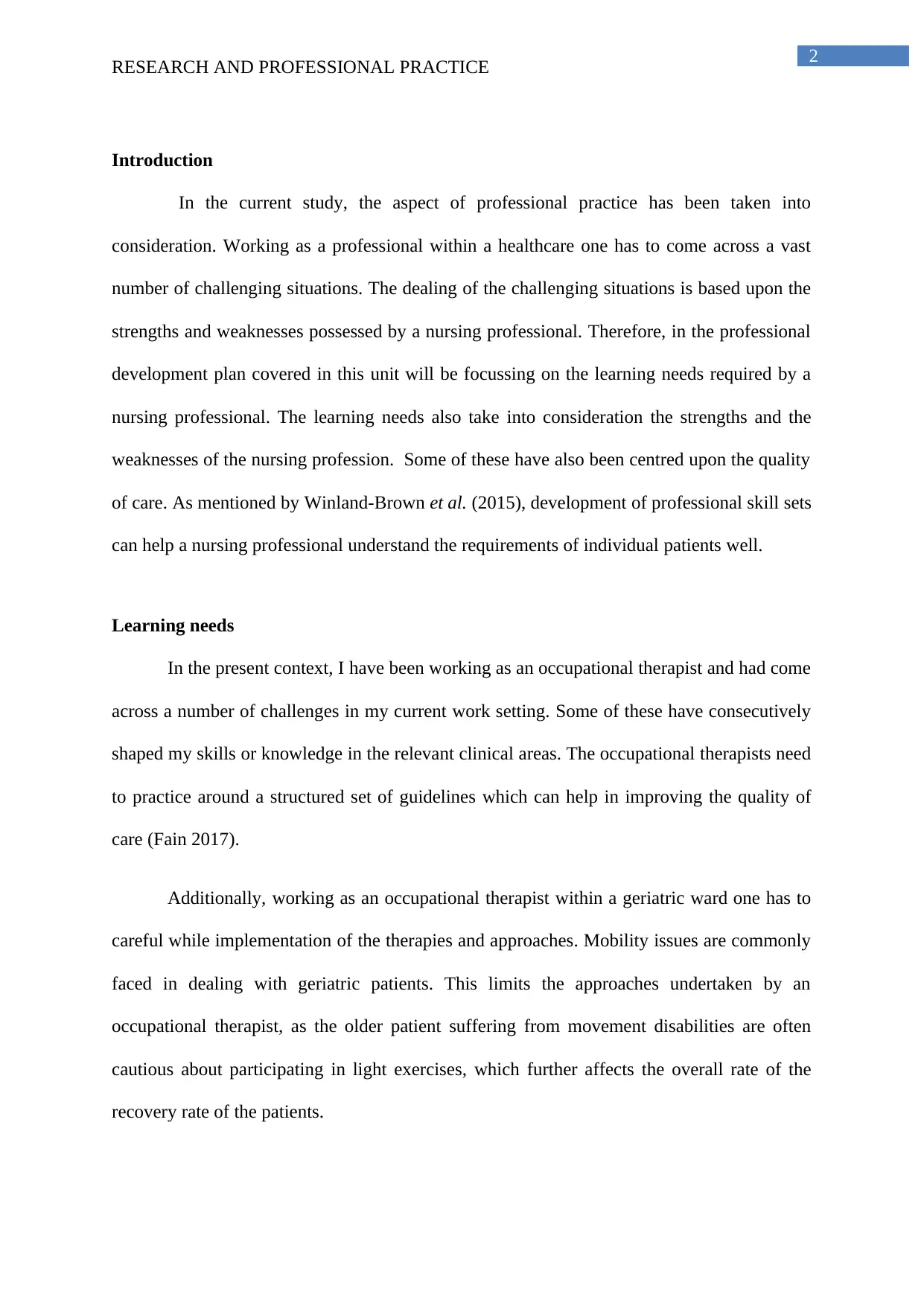
2
RESEARCH AND PROFESSIONAL PRACTICE
Introduction
In the current study, the aspect of professional practice has been taken into
consideration. Working as a professional within a healthcare one has to come across a vast
number of challenging situations. The dealing of the challenging situations is based upon the
strengths and weaknesses possessed by a nursing professional. Therefore, in the professional
development plan covered in this unit will be focussing on the learning needs required by a
nursing professional. The learning needs also take into consideration the strengths and the
weaknesses of the nursing profession. Some of these have also been centred upon the quality
of care. As mentioned by Winland-Brown et al. (2015), development of professional skill sets
can help a nursing professional understand the requirements of individual patients well.
Learning needs
In the present context, I have been working as an occupational therapist and had come
across a number of challenges in my current work setting. Some of these have consecutively
shaped my skills or knowledge in the relevant clinical areas. The occupational therapists need
to practice around a structured set of guidelines which can help in improving the quality of
care (Fain 2017).
Additionally, working as an occupational therapist within a geriatric ward one has to
careful while implementation of the therapies and approaches. Mobility issues are commonly
faced in dealing with geriatric patients. This limits the approaches undertaken by an
occupational therapist, as the older patient suffering from movement disabilities are often
cautious about participating in light exercises, which further affects the overall rate of the
recovery rate of the patients.
RESEARCH AND PROFESSIONAL PRACTICE
Introduction
In the current study, the aspect of professional practice has been taken into
consideration. Working as a professional within a healthcare one has to come across a vast
number of challenging situations. The dealing of the challenging situations is based upon the
strengths and weaknesses possessed by a nursing professional. Therefore, in the professional
development plan covered in this unit will be focussing on the learning needs required by a
nursing professional. The learning needs also take into consideration the strengths and the
weaknesses of the nursing profession. Some of these have also been centred upon the quality
of care. As mentioned by Winland-Brown et al. (2015), development of professional skill sets
can help a nursing professional understand the requirements of individual patients well.
Learning needs
In the present context, I have been working as an occupational therapist and had come
across a number of challenges in my current work setting. Some of these have consecutively
shaped my skills or knowledge in the relevant clinical areas. The occupational therapists need
to practice around a structured set of guidelines which can help in improving the quality of
care (Fain 2017).
Additionally, working as an occupational therapist within a geriatric ward one has to
careful while implementation of the therapies and approaches. Mobility issues are commonly
faced in dealing with geriatric patients. This limits the approaches undertaken by an
occupational therapist, as the older patient suffering from movement disabilities are often
cautious about participating in light exercises, which further affects the overall rate of the
recovery rate of the patients.
⊘ This is a preview!⊘
Do you want full access?
Subscribe today to unlock all pages.

Trusted by 1+ million students worldwide
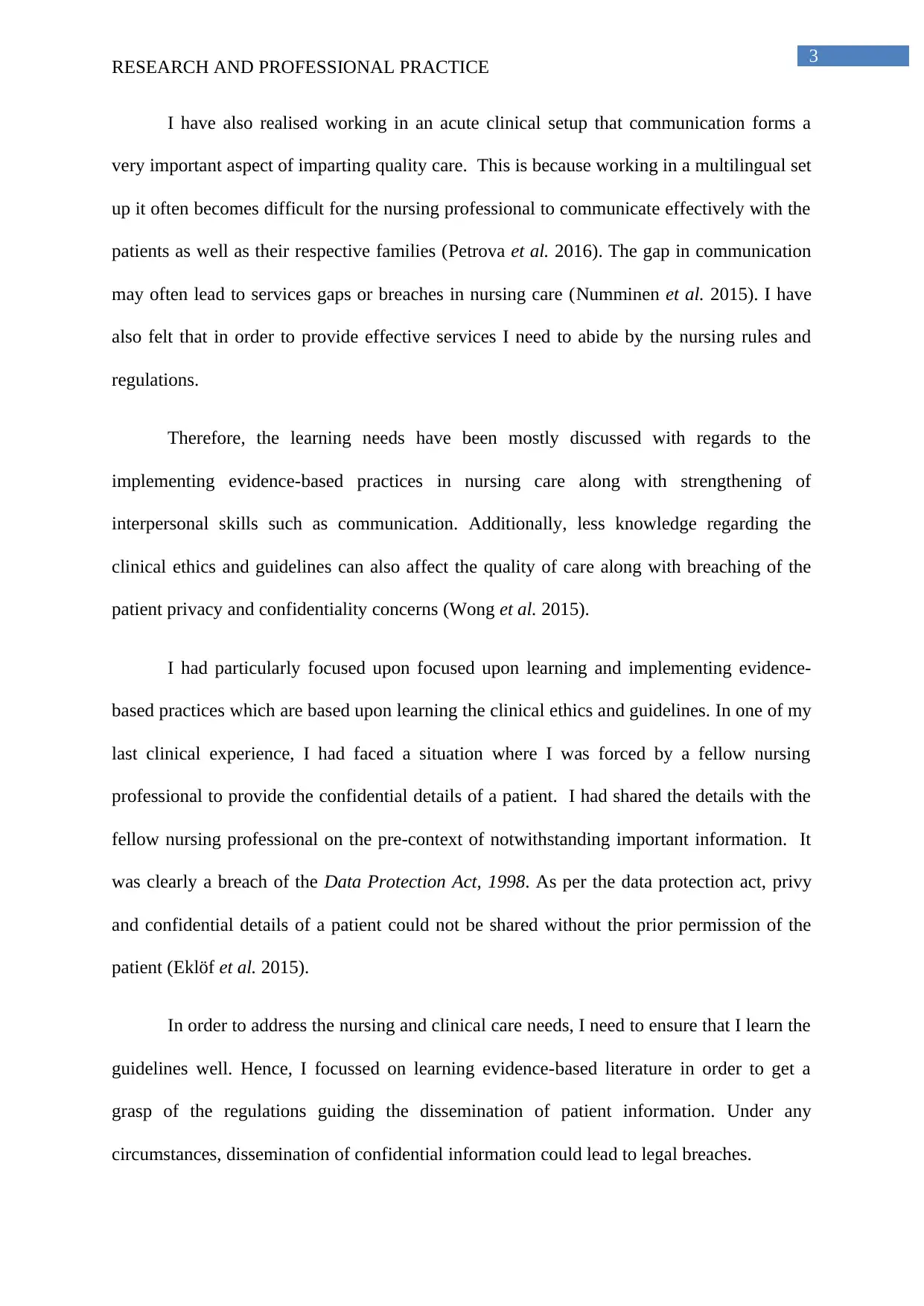
3
RESEARCH AND PROFESSIONAL PRACTICE
I have also realised working in an acute clinical setup that communication forms a
very important aspect of imparting quality care. This is because working in a multilingual set
up it often becomes difficult for the nursing professional to communicate effectively with the
patients as well as their respective families (Petrova et al. 2016). The gap in communication
may often lead to services gaps or breaches in nursing care (Numminen et al. 2015). I have
also felt that in order to provide effective services I need to abide by the nursing rules and
regulations.
Therefore, the learning needs have been mostly discussed with regards to the
implementing evidence-based practices in nursing care along with strengthening of
interpersonal skills such as communication. Additionally, less knowledge regarding the
clinical ethics and guidelines can also affect the quality of care along with breaching of the
patient privacy and confidentiality concerns (Wong et al. 2015).
I had particularly focused upon focused upon learning and implementing evidence-
based practices which are based upon learning the clinical ethics and guidelines. In one of my
last clinical experience, I had faced a situation where I was forced by a fellow nursing
professional to provide the confidential details of a patient. I had shared the details with the
fellow nursing professional on the pre-context of notwithstanding important information. It
was clearly a breach of the Data Protection Act, 1998. As per the data protection act, privy
and confidential details of a patient could not be shared without the prior permission of the
patient (Eklöf et al. 2015).
In order to address the nursing and clinical care needs, I need to ensure that I learn the
guidelines well. Hence, I focussed on learning evidence-based literature in order to get a
grasp of the regulations guiding the dissemination of patient information. Under any
circumstances, dissemination of confidential information could lead to legal breaches.
RESEARCH AND PROFESSIONAL PRACTICE
I have also realised working in an acute clinical setup that communication forms a
very important aspect of imparting quality care. This is because working in a multilingual set
up it often becomes difficult for the nursing professional to communicate effectively with the
patients as well as their respective families (Petrova et al. 2016). The gap in communication
may often lead to services gaps or breaches in nursing care (Numminen et al. 2015). I have
also felt that in order to provide effective services I need to abide by the nursing rules and
regulations.
Therefore, the learning needs have been mostly discussed with regards to the
implementing evidence-based practices in nursing care along with strengthening of
interpersonal skills such as communication. Additionally, less knowledge regarding the
clinical ethics and guidelines can also affect the quality of care along with breaching of the
patient privacy and confidentiality concerns (Wong et al. 2015).
I had particularly focused upon focused upon learning and implementing evidence-
based practices which are based upon learning the clinical ethics and guidelines. In one of my
last clinical experience, I had faced a situation where I was forced by a fellow nursing
professional to provide the confidential details of a patient. I had shared the details with the
fellow nursing professional on the pre-context of notwithstanding important information. It
was clearly a breach of the Data Protection Act, 1998. As per the data protection act, privy
and confidential details of a patient could not be shared without the prior permission of the
patient (Eklöf et al. 2015).
In order to address the nursing and clinical care needs, I need to ensure that I learn the
guidelines well. Hence, I focussed on learning evidence-based literature in order to get a
grasp of the regulations guiding the dissemination of patient information. Under any
circumstances, dissemination of confidential information could lead to legal breaches.
Paraphrase This Document
Need a fresh take? Get an instant paraphrase of this document with our AI Paraphraser
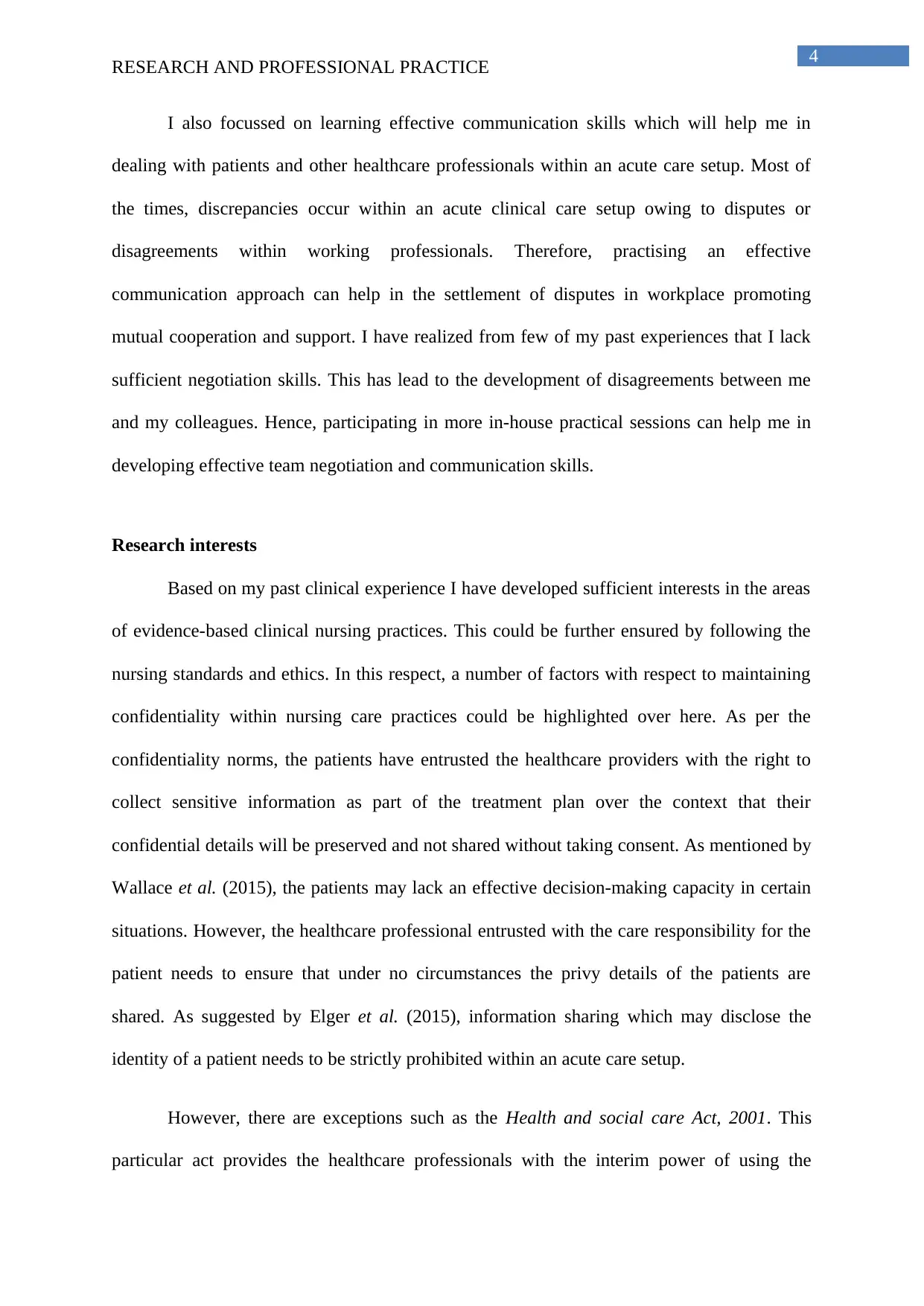
4
RESEARCH AND PROFESSIONAL PRACTICE
I also focussed on learning effective communication skills which will help me in
dealing with patients and other healthcare professionals within an acute care setup. Most of
the times, discrepancies occur within an acute clinical care setup owing to disputes or
disagreements within working professionals. Therefore, practising an effective
communication approach can help in the settlement of disputes in workplace promoting
mutual cooperation and support. I have realized from few of my past experiences that I lack
sufficient negotiation skills. This has lead to the development of disagreements between me
and my colleagues. Hence, participating in more in-house practical sessions can help me in
developing effective team negotiation and communication skills.
Research interests
Based on my past clinical experience I have developed sufficient interests in the areas
of evidence-based clinical nursing practices. This could be further ensured by following the
nursing standards and ethics. In this respect, a number of factors with respect to maintaining
confidentiality within nursing care practices could be highlighted over here. As per the
confidentiality norms, the patients have entrusted the healthcare providers with the right to
collect sensitive information as part of the treatment plan over the context that their
confidential details will be preserved and not shared without taking consent. As mentioned by
Wallace et al. (2015), the patients may lack an effective decision-making capacity in certain
situations. However, the healthcare professional entrusted with the care responsibility for the
patient needs to ensure that under no circumstances the privy details of the patients are
shared. As suggested by Elger et al. (2015), information sharing which may disclose the
identity of a patient needs to be strictly prohibited within an acute care setup.
However, there are exceptions such as the Health and social care Act, 2001. This
particular act provides the healthcare professionals with the interim power of using the
RESEARCH AND PROFESSIONAL PRACTICE
I also focussed on learning effective communication skills which will help me in
dealing with patients and other healthcare professionals within an acute care setup. Most of
the times, discrepancies occur within an acute clinical care setup owing to disputes or
disagreements within working professionals. Therefore, practising an effective
communication approach can help in the settlement of disputes in workplace promoting
mutual cooperation and support. I have realized from few of my past experiences that I lack
sufficient negotiation skills. This has lead to the development of disagreements between me
and my colleagues. Hence, participating in more in-house practical sessions can help me in
developing effective team negotiation and communication skills.
Research interests
Based on my past clinical experience I have developed sufficient interests in the areas
of evidence-based clinical nursing practices. This could be further ensured by following the
nursing standards and ethics. In this respect, a number of factors with respect to maintaining
confidentiality within nursing care practices could be highlighted over here. As per the
confidentiality norms, the patients have entrusted the healthcare providers with the right to
collect sensitive information as part of the treatment plan over the context that their
confidential details will be preserved and not shared without taking consent. As mentioned by
Wallace et al. (2015), the patients may lack an effective decision-making capacity in certain
situations. However, the healthcare professional entrusted with the care responsibility for the
patient needs to ensure that under no circumstances the privy details of the patients are
shared. As suggested by Elger et al. (2015), information sharing which may disclose the
identity of a patient needs to be strictly prohibited within an acute care setup.
However, there are exceptions such as the Health and social care Act, 2001. This
particular act provides the healthcare professionals with the interim power of using the
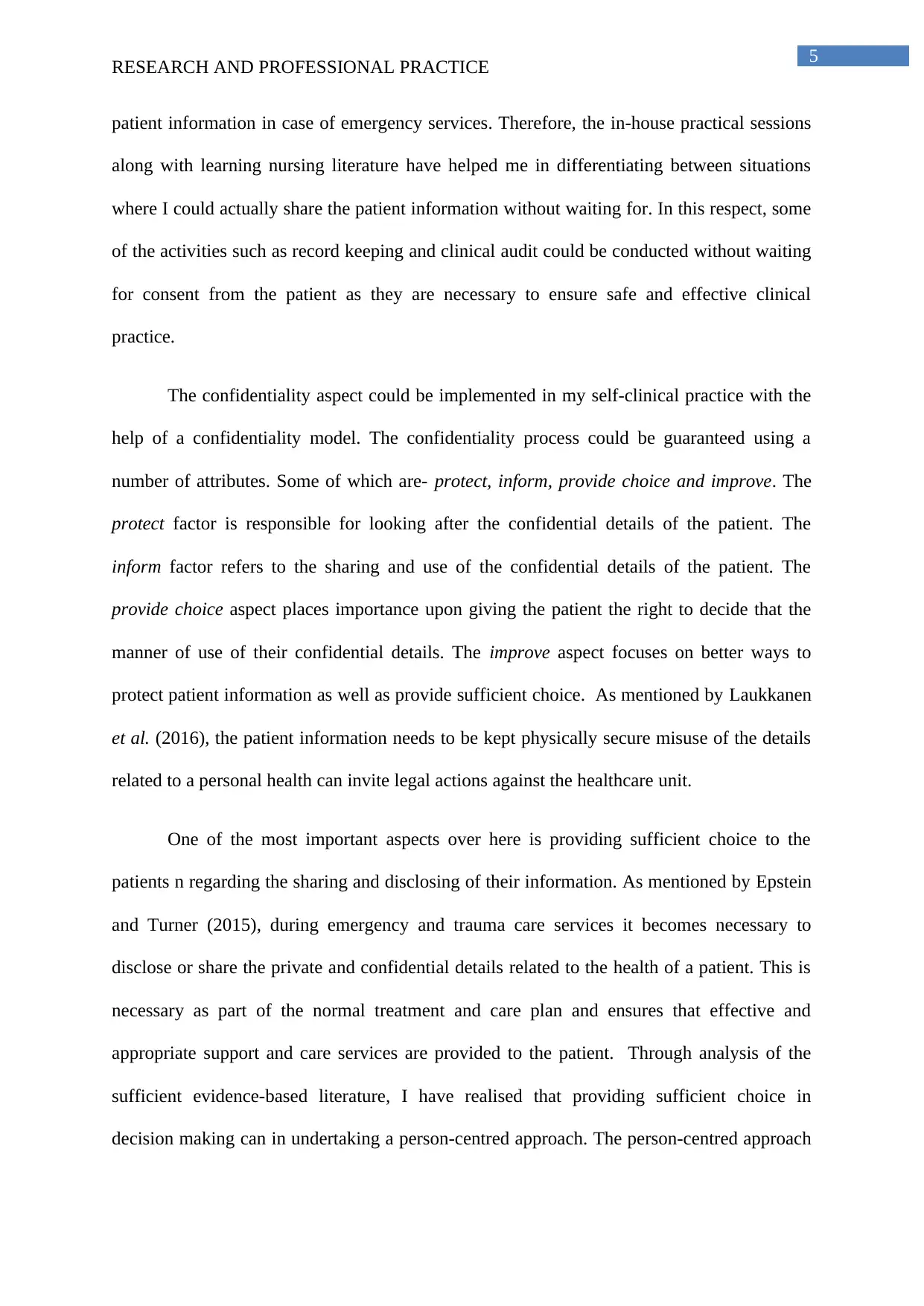
5
RESEARCH AND PROFESSIONAL PRACTICE
patient information in case of emergency services. Therefore, the in-house practical sessions
along with learning nursing literature have helped me in differentiating between situations
where I could actually share the patient information without waiting for. In this respect, some
of the activities such as record keeping and clinical audit could be conducted without waiting
for consent from the patient as they are necessary to ensure safe and effective clinical
practice.
The confidentiality aspect could be implemented in my self-clinical practice with the
help of a confidentiality model. The confidentiality process could be guaranteed using a
number of attributes. Some of which are- protect, inform, provide choice and improve. The
protect factor is responsible for looking after the confidential details of the patient. The
inform factor refers to the sharing and use of the confidential details of the patient. The
provide choice aspect places importance upon giving the patient the right to decide that the
manner of use of their confidential details. The improve aspect focuses on better ways to
protect patient information as well as provide sufficient choice. As mentioned by Laukkanen
et al. (2016), the patient information needs to be kept physically secure misuse of the details
related to a personal health can invite legal actions against the healthcare unit.
One of the most important aspects over here is providing sufficient choice to the
patients n regarding the sharing and disclosing of their information. As mentioned by Epstein
and Turner (2015), during emergency and trauma care services it becomes necessary to
disclose or share the private and confidential details related to the health of a patient. This is
necessary as part of the normal treatment and care plan and ensures that effective and
appropriate support and care services are provided to the patient. Through analysis of the
sufficient evidence-based literature, I have realised that providing sufficient choice in
decision making can in undertaking a person-centred approach. The person-centred approach
RESEARCH AND PROFESSIONAL PRACTICE
patient information in case of emergency services. Therefore, the in-house practical sessions
along with learning nursing literature have helped me in differentiating between situations
where I could actually share the patient information without waiting for. In this respect, some
of the activities such as record keeping and clinical audit could be conducted without waiting
for consent from the patient as they are necessary to ensure safe and effective clinical
practice.
The confidentiality aspect could be implemented in my self-clinical practice with the
help of a confidentiality model. The confidentiality process could be guaranteed using a
number of attributes. Some of which are- protect, inform, provide choice and improve. The
protect factor is responsible for looking after the confidential details of the patient. The
inform factor refers to the sharing and use of the confidential details of the patient. The
provide choice aspect places importance upon giving the patient the right to decide that the
manner of use of their confidential details. The improve aspect focuses on better ways to
protect patient information as well as provide sufficient choice. As mentioned by Laukkanen
et al. (2016), the patient information needs to be kept physically secure misuse of the details
related to a personal health can invite legal actions against the healthcare unit.
One of the most important aspects over here is providing sufficient choice to the
patients n regarding the sharing and disclosing of their information. As mentioned by Epstein
and Turner (2015), during emergency and trauma care services it becomes necessary to
disclose or share the private and confidential details related to the health of a patient. This is
necessary as part of the normal treatment and care plan and ensures that effective and
appropriate support and care services are provided to the patient. Through analysis of the
sufficient evidence-based literature, I have realised that providing sufficient choice in
decision making can in undertaking a person-centred approach. The person-centred approach
⊘ This is a preview!⊘
Do you want full access?
Subscribe today to unlock all pages.

Trusted by 1+ million students worldwide
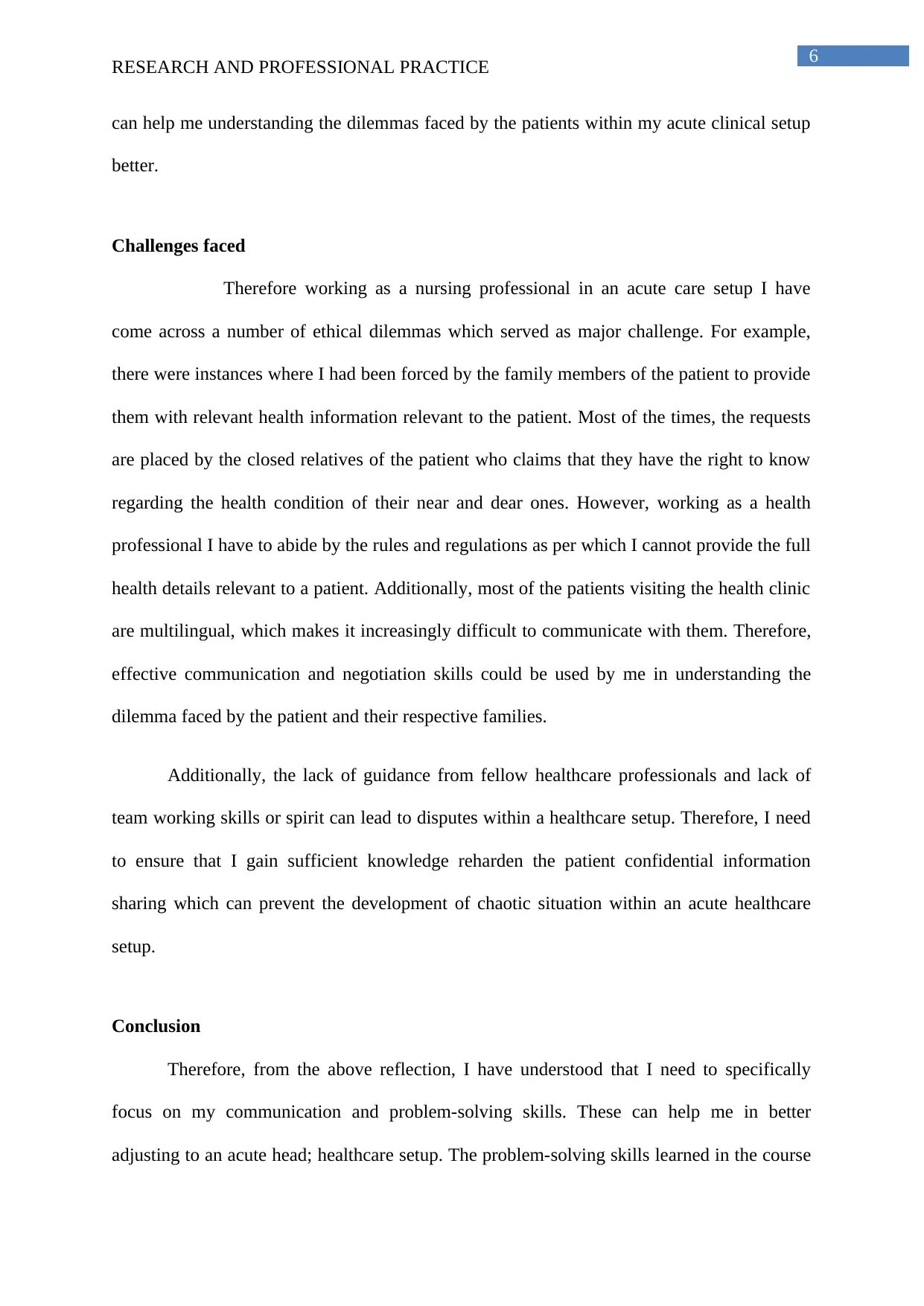
6
RESEARCH AND PROFESSIONAL PRACTICE
can help me understanding the dilemmas faced by the patients within my acute clinical setup
better.
Challenges faced
Therefore working as a nursing professional in an acute care setup I have
come across a number of ethical dilemmas which served as major challenge. For example,
there were instances where I had been forced by the family members of the patient to provide
them with relevant health information relevant to the patient. Most of the times, the requests
are placed by the closed relatives of the patient who claims that they have the right to know
regarding the health condition of their near and dear ones. However, working as a health
professional I have to abide by the rules and regulations as per which I cannot provide the full
health details relevant to a patient. Additionally, most of the patients visiting the health clinic
are multilingual, which makes it increasingly difficult to communicate with them. Therefore,
effective communication and negotiation skills could be used by me in understanding the
dilemma faced by the patient and their respective families.
Additionally, the lack of guidance from fellow healthcare professionals and lack of
team working skills or spirit can lead to disputes within a healthcare setup. Therefore, I need
to ensure that I gain sufficient knowledge reharden the patient confidential information
sharing which can prevent the development of chaotic situation within an acute healthcare
setup.
Conclusion
Therefore, from the above reflection, I have understood that I need to specifically
focus on my communication and problem-solving skills. These can help me in better
adjusting to an acute head; healthcare setup. The problem-solving skills learned in the course
RESEARCH AND PROFESSIONAL PRACTICE
can help me understanding the dilemmas faced by the patients within my acute clinical setup
better.
Challenges faced
Therefore working as a nursing professional in an acute care setup I have
come across a number of ethical dilemmas which served as major challenge. For example,
there were instances where I had been forced by the family members of the patient to provide
them with relevant health information relevant to the patient. Most of the times, the requests
are placed by the closed relatives of the patient who claims that they have the right to know
regarding the health condition of their near and dear ones. However, working as a health
professional I have to abide by the rules and regulations as per which I cannot provide the full
health details relevant to a patient. Additionally, most of the patients visiting the health clinic
are multilingual, which makes it increasingly difficult to communicate with them. Therefore,
effective communication and negotiation skills could be used by me in understanding the
dilemma faced by the patient and their respective families.
Additionally, the lack of guidance from fellow healthcare professionals and lack of
team working skills or spirit can lead to disputes within a healthcare setup. Therefore, I need
to ensure that I gain sufficient knowledge reharden the patient confidential information
sharing which can prevent the development of chaotic situation within an acute healthcare
setup.
Conclusion
Therefore, from the above reflection, I have understood that I need to specifically
focus on my communication and problem-solving skills. These can help me in better
adjusting to an acute head; healthcare setup. The problem-solving skills learned in the course
Paraphrase This Document
Need a fresh take? Get an instant paraphrase of this document with our AI Paraphraser
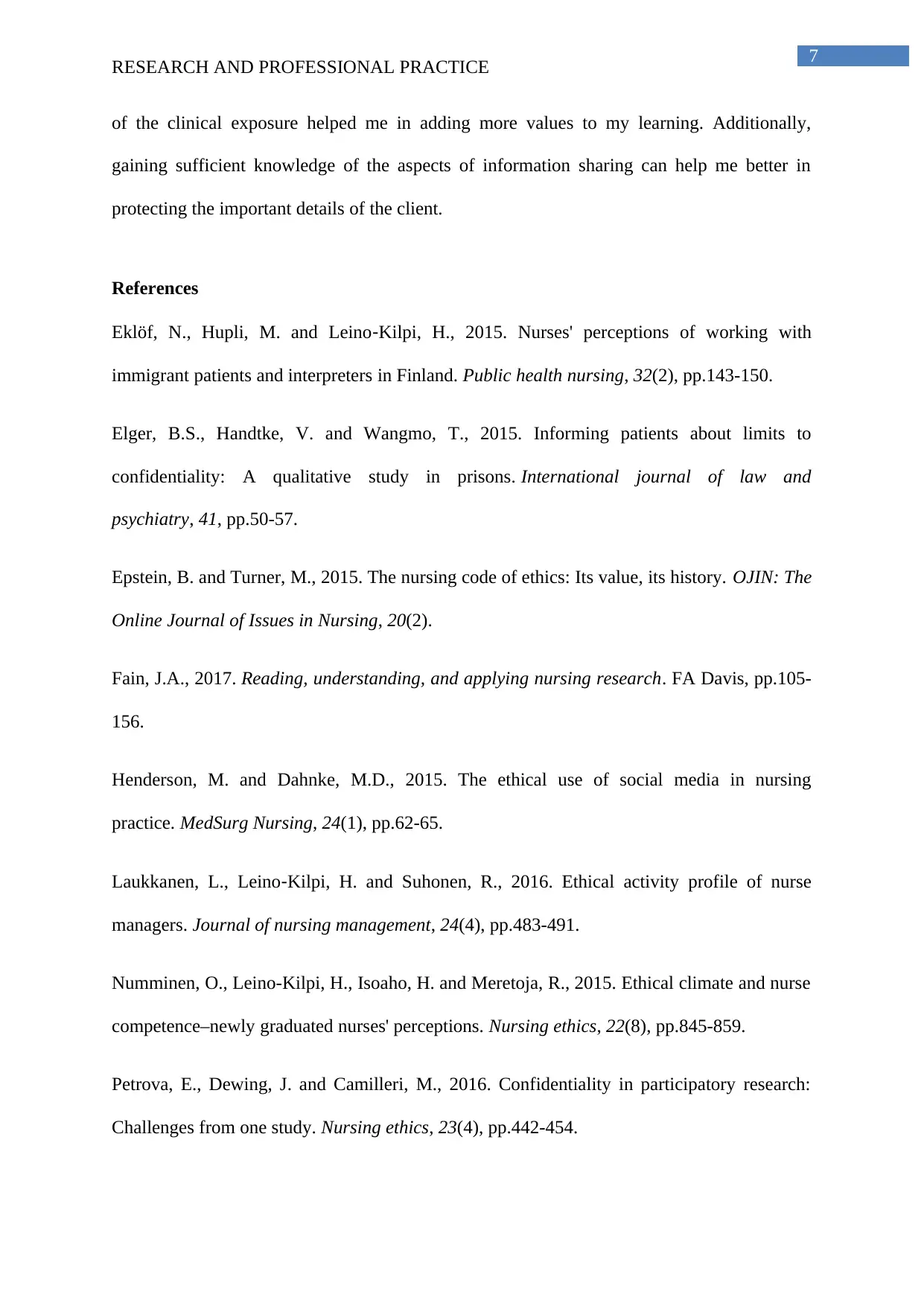
7
RESEARCH AND PROFESSIONAL PRACTICE
of the clinical exposure helped me in adding more values to my learning. Additionally,
gaining sufficient knowledge of the aspects of information sharing can help me better in
protecting the important details of the client.
References
Eklöf, N., Hupli, M. and Leino‐Kilpi, H., 2015. Nurses' perceptions of working with
immigrant patients and interpreters in Finland. Public health nursing, 32(2), pp.143-150.
Elger, B.S., Handtke, V. and Wangmo, T., 2015. Informing patients about limits to
confidentiality: A qualitative study in prisons. International journal of law and
psychiatry, 41, pp.50-57.
Epstein, B. and Turner, M., 2015. The nursing code of ethics: Its value, its history. OJIN: The
Online Journal of Issues in Nursing, 20(2).
Fain, J.A., 2017. Reading, understanding, and applying nursing research. FA Davis, pp.105-
156.
Henderson, M. and Dahnke, M.D., 2015. The ethical use of social media in nursing
practice. MedSurg Nursing, 24(1), pp.62-65.
Laukkanen, L., Leino‐Kilpi, H. and Suhonen, R., 2016. Ethical activity profile of nurse
managers. Journal of nursing management, 24(4), pp.483-491.
Numminen, O., Leino-Kilpi, H., Isoaho, H. and Meretoja, R., 2015. Ethical climate and nurse
competence–newly graduated nurses' perceptions. Nursing ethics, 22(8), pp.845-859.
Petrova, E., Dewing, J. and Camilleri, M., 2016. Confidentiality in participatory research:
Challenges from one study. Nursing ethics, 23(4), pp.442-454.
RESEARCH AND PROFESSIONAL PRACTICE
of the clinical exposure helped me in adding more values to my learning. Additionally,
gaining sufficient knowledge of the aspects of information sharing can help me better in
protecting the important details of the client.
References
Eklöf, N., Hupli, M. and Leino‐Kilpi, H., 2015. Nurses' perceptions of working with
immigrant patients and interpreters in Finland. Public health nursing, 32(2), pp.143-150.
Elger, B.S., Handtke, V. and Wangmo, T., 2015. Informing patients about limits to
confidentiality: A qualitative study in prisons. International journal of law and
psychiatry, 41, pp.50-57.
Epstein, B. and Turner, M., 2015. The nursing code of ethics: Its value, its history. OJIN: The
Online Journal of Issues in Nursing, 20(2).
Fain, J.A., 2017. Reading, understanding, and applying nursing research. FA Davis, pp.105-
156.
Henderson, M. and Dahnke, M.D., 2015. The ethical use of social media in nursing
practice. MedSurg Nursing, 24(1), pp.62-65.
Laukkanen, L., Leino‐Kilpi, H. and Suhonen, R., 2016. Ethical activity profile of nurse
managers. Journal of nursing management, 24(4), pp.483-491.
Numminen, O., Leino-Kilpi, H., Isoaho, H. and Meretoja, R., 2015. Ethical climate and nurse
competence–newly graduated nurses' perceptions. Nursing ethics, 22(8), pp.845-859.
Petrova, E., Dewing, J. and Camilleri, M., 2016. Confidentiality in participatory research:
Challenges from one study. Nursing ethics, 23(4), pp.442-454.
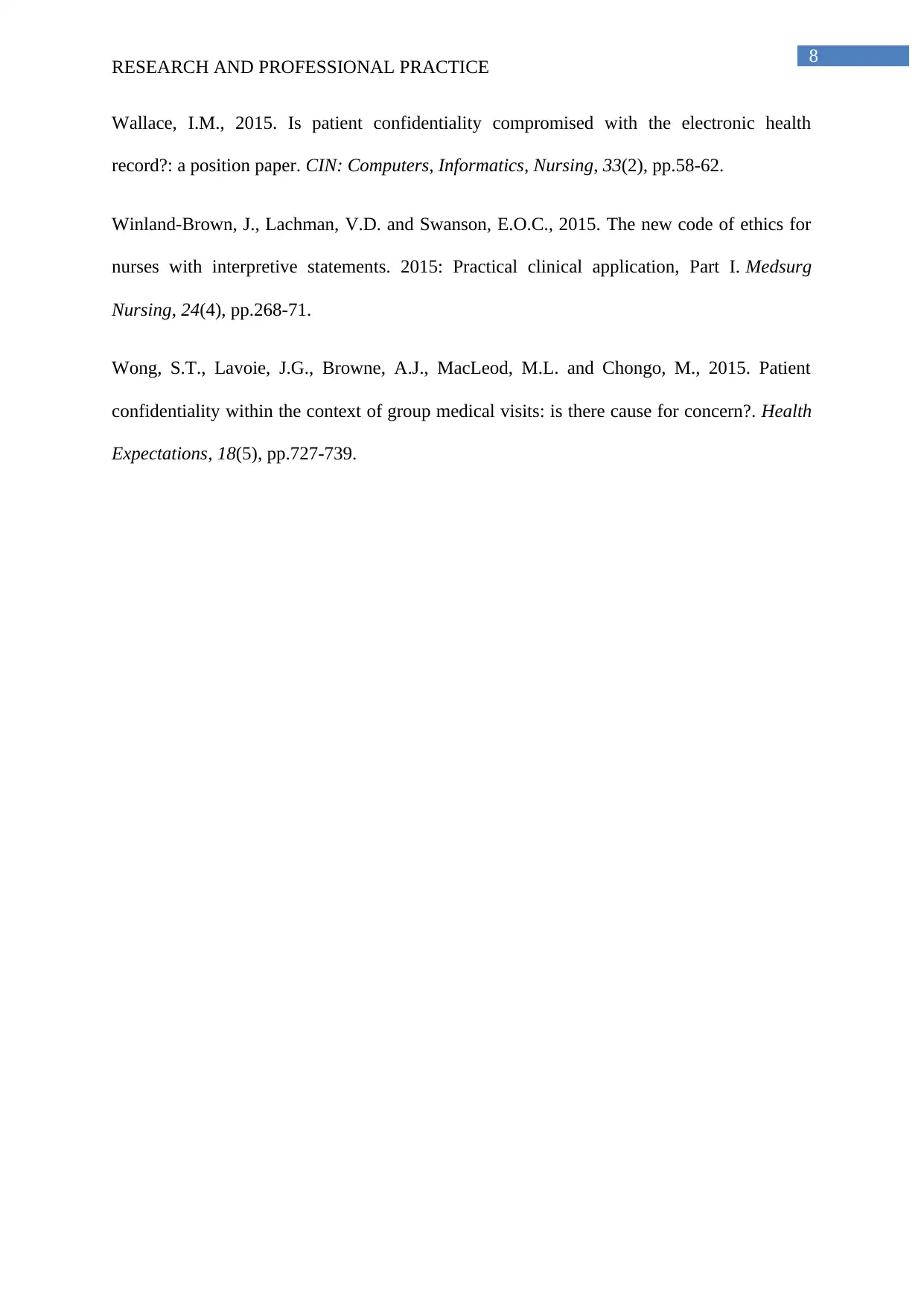
8
RESEARCH AND PROFESSIONAL PRACTICE
Wallace, I.M., 2015. Is patient confidentiality compromised with the electronic health
record?: a position paper. CIN: Computers, Informatics, Nursing, 33(2), pp.58-62.
Winland-Brown, J., Lachman, V.D. and Swanson, E.O.C., 2015. The new code of ethics for
nurses with interpretive statements. 2015: Practical clinical application, Part I. Medsurg
Nursing, 24(4), pp.268-71.
Wong, S.T., Lavoie, J.G., Browne, A.J., MacLeod, M.L. and Chongo, M., 2015. Patient
confidentiality within the context of group medical visits: is there cause for concern?. Health
Expectations, 18(5), pp.727-739.
RESEARCH AND PROFESSIONAL PRACTICE
Wallace, I.M., 2015. Is patient confidentiality compromised with the electronic health
record?: a position paper. CIN: Computers, Informatics, Nursing, 33(2), pp.58-62.
Winland-Brown, J., Lachman, V.D. and Swanson, E.O.C., 2015. The new code of ethics for
nurses with interpretive statements. 2015: Practical clinical application, Part I. Medsurg
Nursing, 24(4), pp.268-71.
Wong, S.T., Lavoie, J.G., Browne, A.J., MacLeod, M.L. and Chongo, M., 2015. Patient
confidentiality within the context of group medical visits: is there cause for concern?. Health
Expectations, 18(5), pp.727-739.
⊘ This is a preview!⊘
Do you want full access?
Subscribe today to unlock all pages.

Trusted by 1+ million students worldwide
1 out of 9
Related Documents
Your All-in-One AI-Powered Toolkit for Academic Success.
+13062052269
info@desklib.com
Available 24*7 on WhatsApp / Email
![[object Object]](/_next/static/media/star-bottom.7253800d.svg)
Unlock your academic potential
Copyright © 2020–2026 A2Z Services. All Rights Reserved. Developed and managed by ZUCOL.





